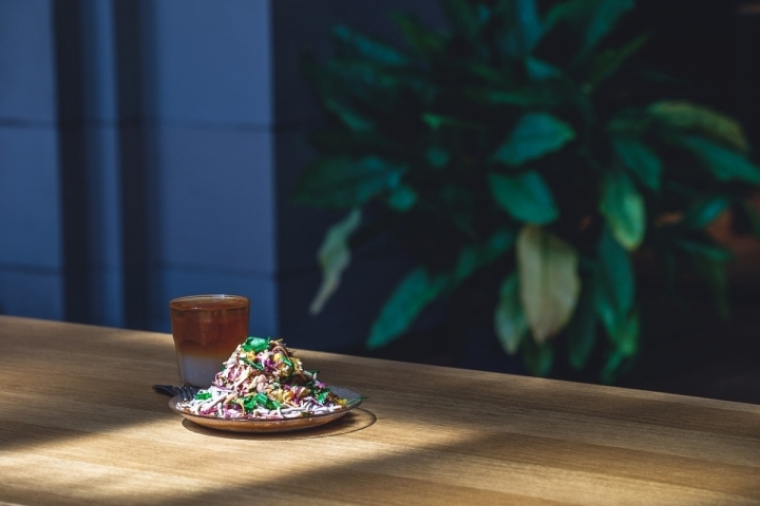
Since the beginning of 2017, I have been on a tumultuous road to embracing a new way of life. This change wasn't part of a new year resolution, nor was it a long time coming. One day, something simply clicked in me and altered my perspective.
When I ponder my recent (and near overnight) transformation, I realise there are few moments in a lifetime in which your worldview radically shifts. Changes to the way you perceive the world are usually subtle, and over time they are moulded and massaged to create a coherent belief system.
These changes may cause internal dissonance, relationship strain, or even public ridicule. In the past months, I have experienced all of these uncomfortable symptoms in the most unexpected places—all because I became a vegetarian.
I have lived the past 25 years as an omnivore, and had never given much thought to vegetarianism. While I always had an affinity with animals and cared for their welfare, on no occasion did this manifest itself in ceasing to eat their flesh.
Interestingly, the short description of me at the bottom of my article has invariably noted that I love animals, and in 2016 I wrote a piece on veganism and how Christians are free to choose either way on the issue.
So why the 180° turn in my life? The reason is complex but founded on two pivotal issues.
My babies
The first stems from having two fur babies—a cat and a retired racing greyhound. I caught myself sickened by the (thankfully declining) mass-murder of racing greyhounds when they retire ten years before the natural end of their life. But the artificial fertilisation, offspring-separation, over/underfeeding and mass-slaughter of cows, pigs, and chickens didn't raise any internal alarm.
I became perturbed that the only reason I distinguished these scenarios was my cultural roots. Eating cats and dogs in New Zealand is unthinkable but almost anything kept in a barn, cage or paddock is fine to (excuse the pun) stock your fridge with. I was repulsed by my culture-induced hypocrisy.
There is no inherent difference in the value of a pig's life to that of a cat's life. In fact, if we only submitted unfriendly, unintelligent or unemotional animals to the butchery life, the pig would likely be the last animal under the knife. Yet the unmistakable waft of sizzling streaky bacon makes us turn a blind eye to the constant abuse they face in their conception, life, and death.
My tastes
This leads me to the second reason I quit eating meat. I loved the taste of meat and it was a convenient way to get the protein and iron my body needs. Were my taste and convenience preferences really worth supporting an industry built on the suffering of living things? The more I considered it, the more I felt convicted that it wasn't a good enough reason anymore.
Even with these two foundational reasons (and additional peripheral ones), I realise this is my own conscience being pricked and that I cannot push it upon others who do not share my conviction. Therefore, I have not announced my diet and mind-set change unless necessary.
Naturally, in social situations where a meal is shared, my new dietary restriction comes up and I am thrust into a firing line of questions, intrigue and sometimes derision. I must admit, I expected to be persecuted for being a Christian, but never thought adopting a plant-based diet would bring such alienation.
In an equally unexpected turn, some friends have desperately tried to justify their eating habits without my prompting; "Oh, I have really been cutting down on meat recently!" "Okay, well I have started having vegetarian Thursdays every second week."
This response evokes curiosity in me. When I divulge my Christian faith, the common response is little more than, "Okay, did you grow up in church?" (the answer to which is no)—yet when I disclose my vegetarianism (without even stating reasons), people react as if I must have immediately begun judging their moral character and expect justification for their behaviour.
When did vegetarianism become a worldview more offensive than Christianity? How can Christianity, which is inherently much more all-encompassing and life-changing, invoke a nonchalant reaction, yet quitting steak supplicates the equivalent of a confession booth?
I am first and foremost a Christian. A sinner saved by grace through faith into adoption as a daughter of the triune God. I am now a saint, my righteousness not my own but inherited from Christ's saving work on the cross. I do not seek to judge others, for I know my heart is at least as self-centred and earthly as any other.
My value does not come from what I eat or do not eat, nor do I have the right to forsake someone for being less concerned about how their food gets to their plate. My role is not to be the meat-police. My role is to be a faithful witness to an infinitely faithful God.
If I am to be persecuted for my faith, then I will gladly take on that burden. Christ's message of sin and salvation, heaven and hell is offensive—so I understand the contempt believers encounter. But I doubt I will ever understand why vegetarianism seems more offensive than Christianity.
I must die to my own flesh, to my desire for convenience and ease. In this case, denying my flesh means forgoing animal flesh. Have you considered where you stand on this issue?

Harriet Knox lives in windy Wellington, New Zealand. She works for the Government, loves animals, and cannot function well without a gym membership. She became a Christian at University and attends Gracenet Community Church.
Harriet Knox's previous articles may be viewed at www.pressserviceinternational.org/harriet-knox.html